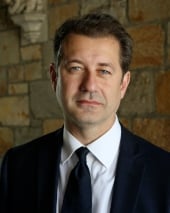Back to Editor profile » Prof. Dr. Alexandre F DaSilva
Prof. Dr. Alexandre F DaSilva

Prof. Dr. Alexandre F DaSilva
Headache and Orofacial Pain Effort (H.O.P.E.) Laboratory, Department of Biologic and Materials Sciences & Prosthodontics, University of Michigan School of Dentistry, Ann Arbor, MI, USA
Dr. Alexandre DaSilva is the Director of H.O.P.E. (Headache & Orofacial Pain Effort) Lab at University of Michigan (UM), which is a multidisciplinary team that investigates the brain as a research and therapeutic target for chronic pain disorders, including migraine, TMD, head and neck cancer pain, and neuropathic pain. He is an Associate Professor in the Biologic and Materials Sciences Department at the UM School of Dentistry, Ann Arbor, where he also serves as the Director of Learning Health Systems.
Dr. DaSilva has received his Doctorate in Medical Science (DMedSc) degree in Oral Biology with clinical training in Orofacial Pain at Harvard University. His thesis demonstrated for the first time in vivo the somatotopic activation (fMRI) of trigeminal pain in the peripheral and central somatosensory pathway in humans. This work was followed by a post-doctoral fellowship on Migraine Neuroimaging at the Martinos Center for Biomedical Imaging, Massachusetts General Hospital, to investigate subcortical and cortical changes in the brains of migraine patients. He was also an Instructor in the Psychiatric Department at Harvard University/McLean Hospital, where he investigated the co-localization of functional and structural cortical neuroplasticity in Trigeminal Neuropathic Pain patients.
With his colleagues at the UM H.O.P.E. lab, he has developed novel technologies for pain research, treatment, and education using molecular (e.g., μ-opioid and D2/D3 dopamine), functional and structural neuroimaging (PET, fNIRS and MRI-based), non-invasive brain stimulation, mobile technology, artificial intelligence, and augmented and virtual reality tools (AV/VR). His UM H.O.P.E. team has conducted multiple clinical neuroimaging and neuromodulation research studies since 2011, enrolling both healthy volunteers and chronic pain patients, including TMD, neuropathic pain and episodic/chronic migraine.
Updated 4 March 2024
